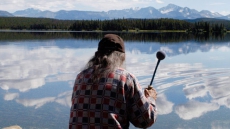HINTON, Alta. - Scientists studying the ravaged caribou habitat of Alberta's northwestern foothills say they have found so much disturbance from decades of industrial use that restoration will have to be selective.
"There's just so much disturbance, it's important we prioritize," said Laura Finnegan, a biologist with the Foothills Research Institute in Hinton, Alta.
The institute is one year into a three-year study on how animals and humans continue to use this ragged landscape in an effort to understand how to best restore it. Governments are counting on that work to help them live up to promises of sustainable development.
This stretch of foothills still looks like pristine, trackless boreal forest when seen from the highway. But back roads into the bush reveal a patchwork of clearcuts, well pads, access roads and seismic lines so extensive that gravel and green greet the eye almost equally.
It's part of an area that recent satellite data suggests is being deforested at a rate that outpaces what's going on in Brazil's rain forests. There are more than 16,000 kilometres of seismic lines, cut by the energy industry through the forest, within the study area's 13,000 square kilometres.
About five per cent of range for the Little Smoky and a la Peche caribou herds remains undisturbed — a long way from the federal government's 65 per cent target.
Finnegan and her colleagues are trying to figure out how to bridge that gap. Their first step is to understand how both animals and humans are using what's on the ground.
That means understanding the impact of seismic lines, which are used to study geology underground.
Wolves normally prefer to prey on deer and moose, but seismic lines allow them to penetrate into the deep woods where caribou hide. Caribou also normally avoid coming within 500 metres of a seismic line, making every line, in effect, a kilometre wide.
It takes up to 70 years in this cold climate for nature to efface a seismic line. The passage of even a single quad can retard that restorative creep by crushing plants and compacting soil.
"You can just look at the vegetation on the line and you'll see tracks," Finnegan said.
Researchers have used sophisticated satellite-based radar to map average vegetation heights across the entire study area to within a few centimetres. They've erected motion-sensitive cameras on selected seismic lines to record what's using them — caribou, wolves and snowmobilers alike.
Preliminary results suggest there's a threshold at which the lines are no longer an easy way for animals to get around.
"Seismic lines with vegetation heights less than 1.4 metres facilitate movement by caribou predators," says the institute's report.
Human use is more complex. Snowmobilers and quadders prefer little ground cover and dry soils as well as lower vegetation.
"Human motorized use of seismic lines is extensive across the range of a la Peche and Little Smoky caribou, and the probability of high levels of motorized human use increased when vegetation height along seismic lines was less than two metres in height," says the report.
Mapping where seismic lines attractive to predators and humans cross what used to be the best caribou habitat could suggest where restoration could do the most good, the researchers say.
Such maps have been produced for the institute's preliminary report. Priority seismic lines for restoration will still add up to many hundreds of kilometres — and the study area is only one small part of a heavily affected natural region that stretches almost all the way down Alberta's western edge.
But the institute's work could provide at least a plan to get started, Finnegan said.
"That's the primary goal of this research, so that land managers on the ground could look at it and know where to begin."





